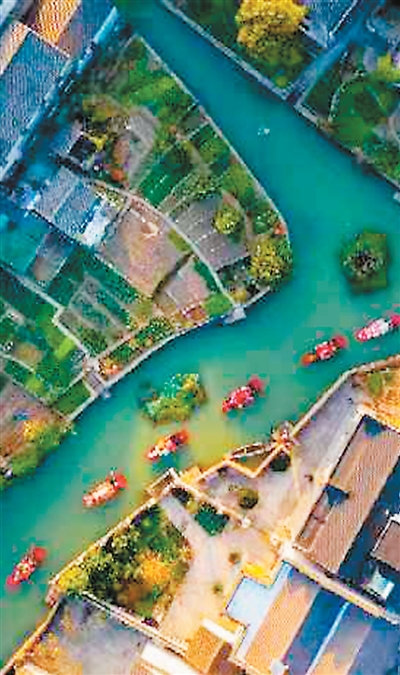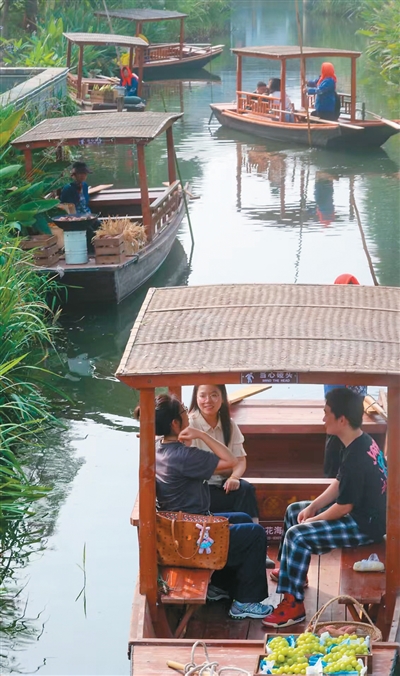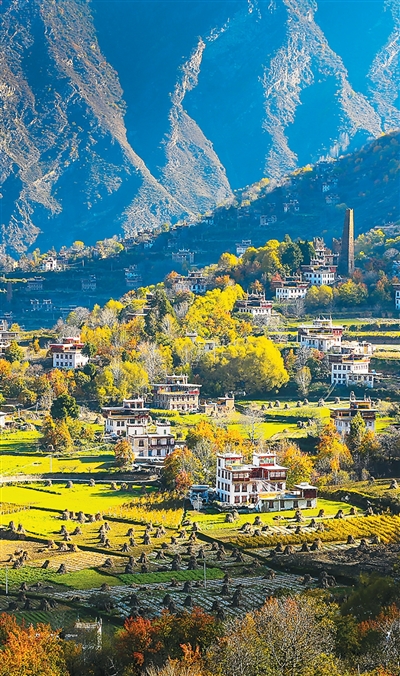




- BRNN
- BRI News
- BRNN News
- Database
Official Documents Polices and Regulations
Inter-government Documents International Cooperation BRI Countries
Business Guide Economic Data BRI Data
Trade
Investment Projects Latest projects
Cases - Content Pool
Four Chinese villages were named among the 2025 "Best Tourism Villages" by the World Tourism Organization (UNWTO) at an award ceremony held in Huzhou, east China's Zhejiang Province, on Oct. 17.
The newly recognized villages are Huanggang in southwest China's Guizhou Province, Jikayi in southwest China's Sichuan Province, Digang in Zhejiang, and Dongluo in east China's Jiangsu Province.
With these additions, a total of 19 Chinese villages have now been recognized as "Best Tourism Villages."
These four villages serve as windows for the world to gain a better understanding of China's rural development in the new era, showcasing the vitality and creativity of the countryside.
Cultural heritage thrives in Huanggang village
Huanggang village, situated in Shuangjiang town, Liping county, Qiandongnan Miao and Dong Autonomous Prefecture, Guizhou, is a living museum of the Dong ethnic group's culture. Traditional Dong architecture — including drum towers and wind-and-rain bridges that ingeniously combine bridges, corridors, verandas and pavilions — dots the village landscape. Intangible cultural heritage crafts such as Dong costumes and indigo dyeing also continue to flourish.
Italian tourist Gaia Carancini and her husband marveled at the well-preserved wooden structures, noting that these buildings are not just tourist attractions; they are where the villagers actually live.

People of the Dong ethnic group celebrate the harvest during a festival in Huanggang village, Shuangjiang town, Liping county, Qiandongnan Miao and Dong Autonomous Prefecture, southwest China's Guizhou Province, Oct. 18. (Photo/Wu Guanghui)
Wu Chenglong, 48, is a provincial-level inheritor of the Grand Song of the Dong ethnic group. "Huanggang is the birthplace of the Grand Song performed by men's choirs. The song is passed down from generation to generation," said Wu, who has been singing the Grand Song for nearly 40 years.
In this village with a history of more than 800 years, the Grand Song is not merely performed on stage but woven into everyday life and festival celebrations.
Inscribed on UNESCO's Representative List of the Intangible Cultural Heritage of Humanity in 2009, the Grand Song has enabled Huanggang to establish a professional heritage preservation team.
"In recent years, our county has organized village singing contests. We've brought the Grand Song to the world stage and attracted international visitors," Wu said with excitement. This summer, musicians from several European countries visited Huanggang and performed the Grand Song with local villagers.
"The active inheritance of culture is the key to Huanggang's success," said Tang Dacai, Party chief and director of the culture, sports, radio, television and tourism bureau of Liping county. A holistic protection approach has brought new vitality to Huanggang. In 2024, the village received 36,800 tourist visits, generating 16.6 million yuan ($2.34 million) in tourism revenue.
Huanggang has developed distinctive programs such as intangible cultural heritage workshops, eco-friendly bed-and-breakfast hotels, and educational tour bases themed on farming culture, encouraging greater participation among villagers while pursuing a sustainable development model that integrates culture, ecology and tourism.
Ancient farming wisdom preserved in Digang village
Digang village in Hefu town, Nanxun district, Huzhou, Zhejiang, was founded during the Southern Song Dynasty (1127-1279). A branch of the Beijing-Hangzhou Grand Canal runs through the village, where small bridges span the waterways and white-walled, black-tiled traditional houses line the banks.

Photo shows a scene from the fish festival held in Digang village, Hefu town, Nanxun district, Huzhou, east China's Zhejiang Province. (Photo courtesy of the people's government of Hefu town)
The village forms part of Huzhou's mulberry-dyke and fish-pond system, a Globally Important Agricultural Heritage System (GIAHS).
It is home to China's most concentrated, largest, and best-preserved traditional mulberry-dyke and fish-pond system. This circular ecological model involves raising silkworms with mulberry leaves, feeding fish with silkworm waste, and fertilizing mulberries with pond mud, achieving near-zero pollution.
Building on this unique advantage, the village has established an educational base themed on the system, allowing visitors to experience authentic fish-mulberry culture firsthand.
A 1,000-square-meter museum dedicated to the system displays more than 300 items, including agricultural tools, plaques and silk products, helping visitors appreciate the system's historical traditions, biodiversity and related customs.
"Many foreigners find China's traditional agricultural culture fascinating. Last year, we welcomed tourists from more than 40 countries, most drawn by our unique traditional culture," said Mo Haiping, Party chief of Digang village.
"We've focused on three development areas: smart fish farming, future farms and smart tourism. We've built a premium water tourism route, an agritourism vacation center, and a food processing factory, creating jobs for more than 300 local residents," Mo added.
This mirrors Huzhou's broader rural revitalization drive. All villages in Huzhou have now been transformed into scenic destinations, with total rural tourism revenue rising from 6.42 billion yuan in 2016 to 14.2 billion yuan in 2024. Rural tourism income now accounts for 15 percent of rural residents' per capita disposable income, and more than 320,000 villagers earn a living from tourism close to home.
Heritage farming systems drive development in Dongluo village
Dongluo village in Xinghua, Jiangsu, sits in the core area of Xinghua Duotian, a "dual heritage" site. The Xinghua Duotian agrosystem was recognized as a GIAHS in 2014, and the Xinghua Duotian Irrigation and Drainage System was designated a World Heritage Irrigation Structure (WHIS) in 2022.

Tourists take boats in Dongluo village, Xinghua, east China's Jiangsu Province. (Photo/Shi Daozhi)
"Duotian" literally means raised farmland. On high marshes, early settlers raised mud into small stacks and gradually developed a unique method of water-land utilization dating back more than 1,000 years. This "dual heritage" has become a major attraction for the village.
Guided by the principle that "lucid waters and lush mountains are invaluable assets," the village has protected, inherited and leveraged its Duotian farmland, transforming itself into a well-known tourism destination.
Through a cooperation model involving government, social capital, and the village collective, Dongluo has created sustainable momentum for rural development.
In 2024, the village's collective disposable income reached 2.85 million yuan, up 5 percent year on year, while villagers' per capita disposable income reached 34,066 yuan, an increase of 8.1 percent.
The village has strengthened environmental protection efforts, enhancing biodiversity conservation, conducting regular water quality monitoring, and establishing birdwatching stations to safeguard its ecosystem.
Dongluo has received multiple national honors, including recognition as a key village for rural tourism development.
According to Luo Guokang, Party chief of Dongluo village, the community will continue to utilize its resources to advance comprehensive rural revitalization.
Cultural tourism flourishes in Jikayi village
Jikayi village in Danba county, Ganzi Tibetan Autonomous Prefecture, Sichuan, lies at elevations ranging from 1,700 to 5,000 meters and is known as a "Tibetan village in the clouds."

Photo shows a stunning view of Jikayi village, Danba county, Ganzi Tibetan Autonomous Prefecture, southwest China's Sichuan Province. (Photo courtesy of the Publicity Department of the Communist Party of China Danba County Committee)
Located in the core area of the Tibetan villages of Danba, Jikayi boasts rich cultural and tourism resources amid breathtaking natural scenery.
Jikayi is a living museum, home to several national-level cultural heritage sites, including the ancient watchtowers of Danba, as well as multiple intangible cultural heritage items, such as the techniques for building traditional Tibetan fortress-like houses.
Currently, 60 percent of households in the village operate bed-and-breakfast hotels, incorporating intangible heritage elements such as black pottery making and Jiarong embroidery.
More than 90 percent of villagers are engaged in tourism, with the industry creating more than 200 jobs. In 2024, villagers' per capita disposable income reached 34,000 yuan. From January to September this year, the village received 331,600 tourist visits, generating total tourism revenue of 364 million yuan. The cultural tourism industry has become a key driver of rural revitalization.
Wang Yuangang, Party chief of the town that administers Jikayi village, said the town will continue to enhance protection of the village and improve tourism planning to offer visitors unique experiences, continuously showcasing the charm of Chinese civilization and the vitality of China's countryside to the world.

Tel:86-10-65363107, 86-10-65368220, 86-10-65363106